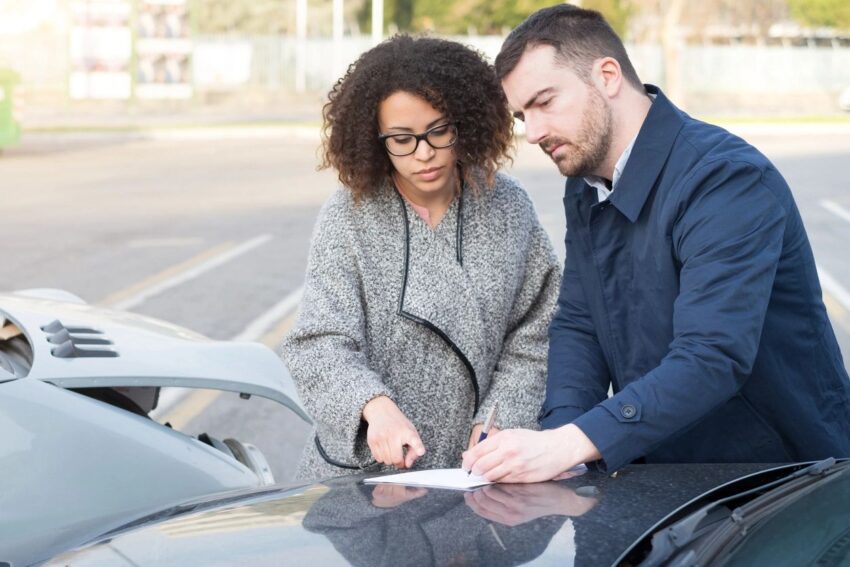There are a lot of aspects when it comes to saving on auto insurance. So much so that it can get overwhelming when you have to plan it all out. However, it’s something that a lot of people have to deal with. Owning a car and insuring it is a regular part of life for the average person. People will always need their cars because they always need to go somewhere. To make it simple, let’s break down car insurance into all its basic expenses and see where each of them lies.
Other Costs When First Buying a Car
Aside from the car’s sticker price, there are other expenses that come with first purchasing a car. These include:
- Car insurance – Auto coverage is a regular expense that nearly every driver in the United States has to put up with. We’ll go into more detail about what car insurance and its cost entail in a later section. What you should know is that every state requires at least a certain amount of car insurance in order to drive legally.
- Taxes – Upon buying a car, there may be some tax charges like any other transaction. This will usually be added to the car’s bill. There isn’t really much you can do to manage this cost.
- Dealer fees – Other accompanying charges when buying a car are the dealer or registration fees. This is to certify that the car is registered with the state. Every car on a dealer’s lot will have a registration fee. However, the exact amount they charge differs from each auto dealer. It helps to look at each dealer’s rates beforehand.
- Maintenance – The upkeep of the car is another regular cost that drivers and owners have to consider. Some cars have maintenance costs that are higher than others due to their parts costing more. This is especially the case for luxury and high-end vehicles.
- Tolls and parking – For metropolitan drivers, parking and toll booths may be a regular part of using the road. Drivers should consider their daily driving and where they plan to park their cars during the day.
How People Commonly Save on Cars
Of course, people will always look for ways to save when confronted with a decision that can be expensive. Fortunately, there are several methods to do this with purchasing a car and even more so when insuring it. The main method for saving when buying a car that is both tried and true is financing the car or getting a loan on it. While this still leaves money on the line, if it isn’t always paid off, it will save money for the time being. However, cars decrease in value over time, while the amount owed towards a financed car will never change until they are paid off. Another method less orientated around the car’s value is buying a used car. They are usually cheaper and reliable with the right paperwork and records.
Financing Your Car vs. Buying a Used Car
When comparing financing a car and buying a used car, the best choice truly depends on the person. Car loan payments can be long-term. Let’s say that you get a car and pay the average of $569 monthly until you are the owner of the car. So, that’s around $6,828 a year. If the car itself costs around $35,000, for example, then it would take just under six years until the car is fully paid off. You can actually get a used car for around $6,828 a year. To summarize, here are the main ways that financing a car and buying a car really compete:
- Maintenance costs – Older, used cars may require more work than a new car would. Because of this, maintenance costs for used cars tend to pile up over time. Meanwhile, new cars don’t need to be taken in as much. Auto repairs can cost thousands of dollars annually, and it would be unwise to continue to shell out money for a car with not that long of a lifespan. However, if the maintenance costs are less than the total financing amount, a used car may be the wisest move.
- Insurance costs – When comparing insurance costs between a financed car and a used car, they will always be higher for a new car. The older a car gets, the less insurance it will actually need, which is why used cars are so easy to insure. Of course, the best route of insurance depends on personal factors too. It helps to look at how often you drive and your record. There is a chance that you can do better with a new car than with a used one.
Budgeting Your Car Insurance With Your Car’s Cost
While new financed cars have higher insurance rates than that of used cars, they also have a factory warranty which extends the insurance when you own the car. Warranties can also help with repairs, so claims aren’t filed as much. When it comes to budgeting your car insurance, always operate within the limits of your state, along with not investing too much in unnecessary coverage. This is especially the case with used cars, wherein full coverage is barely even recommended. Also, be sure you can afford the deductibles you have to pay before filing a claim. You may also qualify for discounts; always ask agents if this is the case for the best results.



